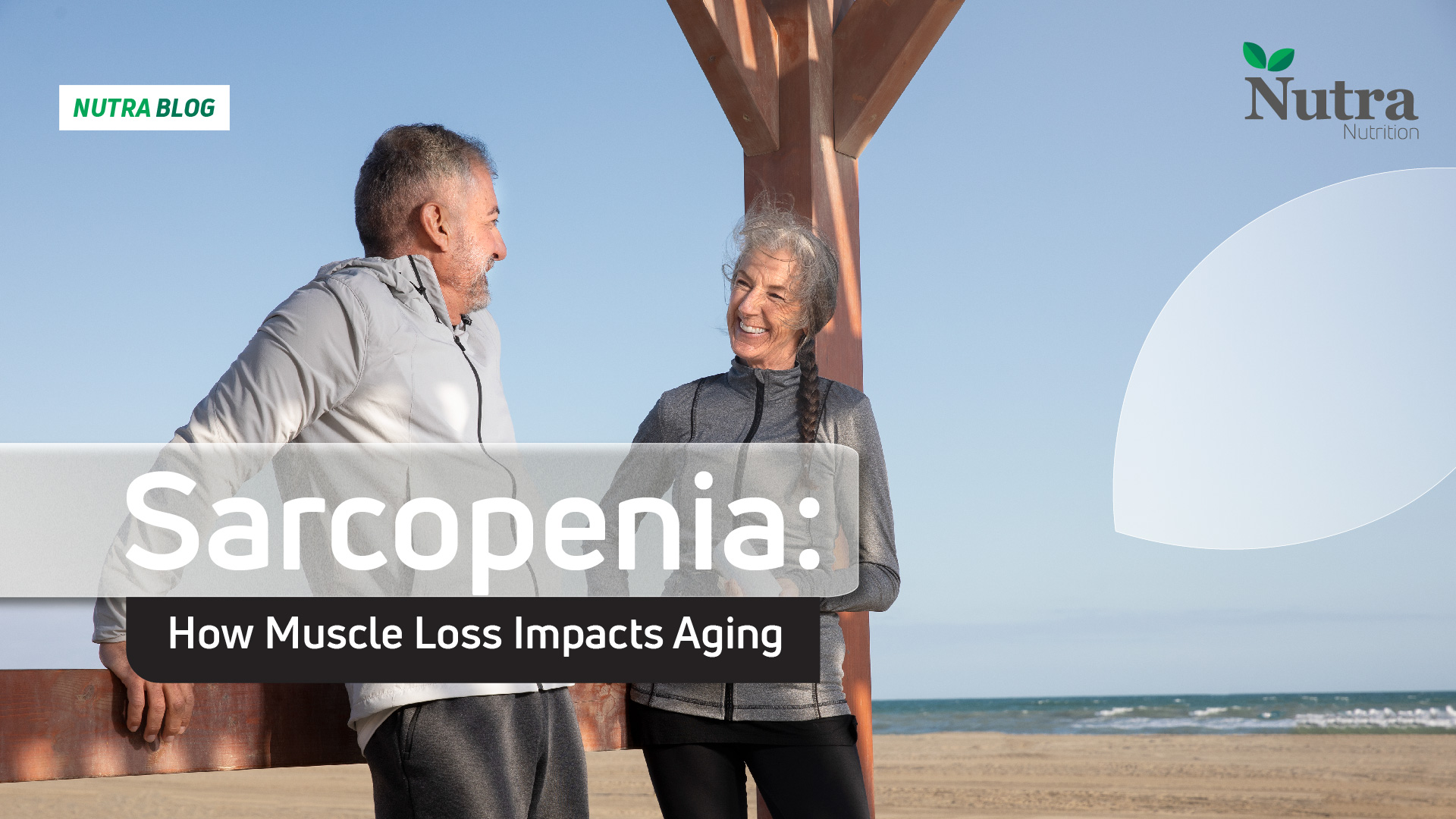Sarcopenia: How Muslce Loss Impacts Aging
- Home
- Nutra Blog: Health and Nutrition
- Sarcopenia: How Muslce Loss Impacts Aging

Sarcopenia: How Muslce Loss Impacts Aging
Nov 6, 2024
By
Nutra Llc
0 comment(s)
Maintaining muscle mass and strength becomes essential for staying active and independent as we age. Sarcopenia, a condition characterized by gradual muscle loss, affects many older adults, potentially leading to decreased mobility and independence. Recent U.S. statistics reveal that nearly 40% of adults aged 60 and older experience reduced muscle strength, putting them at risk for health complications (NCHS Data Brief, 2015). For those looking to counteract this muscle decline, whey protein provides a simple yet effective way to support muscle health.
Understanding Sarcopenia and Muscle Health
Sarcopenia is more than just a natural part of aging; it’s a condition that affects quality of life, impacting daily activities and increasing the risk of falls and fractures. The National Center for Health Statistics reports that reduced muscle strength affects over one-third of Americans aged 60 and older, highlighting the importance of muscle support as we age (NCHS Data Brief, 2015).
How Whey Protein Supports Muscle Health
Whey protein is one of the most effective supplements for maintaining muscle health due to its high-quality amino acids and easy digestibility. This makes it particularly valuable for older adults, as it aids in muscle maintenance without needing intense exercise routines. Here is how whey protein can help:
- Enhanced Protein Synthesis
Whey protein is rich in leucine, an amino acid that promotes muscle protein synthesis. Even light physical activities like walking, gentle stretching, or daily chores, when combined with whey protein, can encourage muscle health by providing essential nutrients for muscle maintenance (Cuyul-Vásquez et al., 2023)(Effectiveness of Whey P…). - Support for Muscle Strength
Research shows that incorporating whey protein into your diet helps maintain muscle strength over time. Improvements in handgrip strength, for instance, can be achieved through regular protein intake, supporting daily activities like carrying groceries or opening containers, essential for maintaining independence (Kuo et al., 2022)(Effect of Whey Protein …). - Bone Health for Postmenopausal Women
Postmenopausal women face higher risks of muscle and bone loss due to hormonal changes. Whey protein supports both muscle strength and bone health, helping to maintain stability and reduce the risk of falls, without the need for intense physical routines (Kuo et al., 2022)(Effect of Whey Protein …).
Types of Whey Protein: Choosing the Right Supplement
Choosing the right whey protein can make it easier to incorporate into your routine. Here are some common types to consider:
- Whey Protein Isolate: High in purity and low in fat and carbohydrates, making it suitable for those focusing on lean muscle support.
- Whey Protein Concentrate: Contains more natural nutrients from the original whey, providing a balanced nutrient profile.
- Hydrolyzed Whey Protein: Pre-digested for easier absorption, which may be especially beneficial after light physical activity.
Simple Ways to Incorporate Whey Protein
For those new to whey protein, start with 20-30 grams daily, either with meals or as a snack. Adding whey protein to smoothies, oatmeal, or even as a simple shake can be an easy and enjoyable way to meet your protein needs, no matter your physical activity level.
Sarcopenia in Aging Adults: Why Act Now?
With nearly 40% of older adults in the U.S. experiencing reduced muscle strength, incorporating whey protein into your diet can be a proactive step toward maintaining muscle function and supporting overall health (NCHS Data Brief, 2015). It’s about small, sustainable changes that can make a big difference in maintaining your strength and independence.
At Nutra LLC, we’re committed to supporting your wellness journey. Explore our range of high-quality whey protein supplements designed to support muscle health for older adults. Visit us at www.storenutra.com to find the perfect fit for your health needs.
References
- National Center for Health Statistics. (2015). Prevalence of Reduced Muscle Strength in Older U.S. Adults, United States, 2011–2012. NCHS Data Brief, (179).Retrieved from National Center for Health Statistics
- Cuyul-Vásquez, I., Pezo-Navarrete, J., Vargas-Arriagada, C., Ortega-Díaz, C., Sepúlveda-Loyola, W., Hirabara, S.M., & Marzuca-Nassr, G.N. (2023). Effectiveness of Whey Protein Supplementation during Resistance Exercise Training on Skeletal Muscle Mass and Strength in Older People with Sarcopenia: A Systematic Review and Meta-Analysis. Nutrients, 15(3424). Retrieved from NIH
- Kuo, Y.-Y., Chang, H.-Y., Huang, Y.-C., & Liu, C.-W. (2022). Effect of Whey Protein Supplementation in Postmenopausal Women: A Systematic Review and Meta-Analysis. Nutrients, 14(4210). Retrieved from NIH
*Disclaimer: Statements made, or products sold through this website, have not been evaluated by the United States Food and Drug Administration.
They are not intended to diagnose, treat, cure or prevent any disease.
